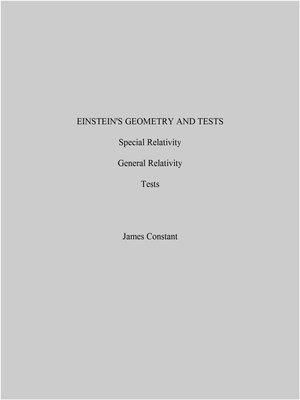
Sign up to save your library
With an OverDrive account, you can save your favorite libraries for at-a-glance information about availability. Find out more about OverDrive accounts.
Find this title in Libby, the library reading app by OverDrive.



Search for a digital library with this title
Title found at these libraries:
| Library Name | Distance |
|---|---|
| Loading... |
General Relativity is the theory of gravity that incorporates special relativity and the weak equivalence principle which states that accelerating frames of reference and gravitational fields are indistinguishable. It is a metric theory, sometimes also called a geometric theory. Metric theories describe physical phenomena in terms of differential geometry.This stands in contrast to Isaac Newton's Law of Universal Gravitation, which described gravity in terms of a vector field. The equivalence principle permits General Relativity to replace Newton's force by Riemann's geometry. Amazingly, General Relativity claims it describes both Newton's metric Galactic Universe and Planck's metric-less Extra Galactic Radiation Universe. I question General Relativity's claim to being an axiomatic geometric theory.
Einstein's view on geometry was ambivalent. In geometry, axioms have served us well and axiomatic geometry has evolved over the past several thousand years and now includes linear Euclidean and non-linear Euclidean geometries. The idea that a physical geometry, therefore, exists outside axiomatic geometry is unproved. While Einstein's geometry identifies with Riemann's geometry, it has no axiomatic basis and relies on substantial simplifications winding up in Newtonian approximations and axiomatic Euclidean metrics for its proofs. Experimental science is a more recent development and is being codified along the way. Here, note that Newton's Theory of Gravitation, Maxwell's Theory of Electromagnetism, and Einstein's Theory of Special Relativity, and Quantum Mechanics have been abundantly confirmed experimentally. Einstein's theory of gravitation has few experimental results and his attempt to replace cosmic gravity by geometry fails for lack of geometric axiomatic basis and dearth of experimental results. First, I concentrate on General Relativity's lack of axiomatic geometry and later briefly discuss its lack of experimental results.







